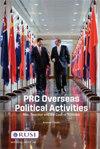致谢
Q4 Social Sciences
引用次数: 0
摘要
这份白厅文件考察了海湾国家和亚洲国家之间正在进行的和解,解释了如何将当前的趋势定性为战略对冲。这项研究背后的最初想法是在2012年春天,当时我作为北约官员首次飞往阿布扎比。直到那时,当面对亚洲在海湾地区的实际存在时,我才开始调查这个话题,并撰写了几本出版物。后来,当我提出更好地理解海湾-亚洲关系的理由时,北约决策者通常会表现出困惑和困惑,这无疑让我相信,迫切需要对这一主题进行战略分析。在撰写本文的整个过程中,我有幸得到了来自海湾、亚洲、欧洲和美国的许多学者和从业者的支持和建议。特别是,我要感谢Frederic Grare、Fatiha Dazi Heni和Jonathan Fulton,他慷慨地花时间审阅了手稿的早期草稿,并提供了宝贵的意见,使我能够澄清和加强我的论点。最后,我对英国皇家联合军种研究所的支持深表感谢。Malcolm Chalmers和Emma De Angelis相信最初的提议,并支持我将其变成白厅文件。我感谢两位匿名评审员的有益和建设性意见,他们为改进最终版本做出了巨大贡献。显然,这篇论文的不足是我自己的。这里表达的观点完全是我的,并不反映阿联酋国防学院的观点。本文章由计算机程序翻译,如有差异,请以英文原文为准。
Acknowledgements
This Whitehall Paper examines the ongoing rapprochement between Gulf and Asian states, explaining how this current trend can be characterised as a case of strategic hedging. The initial idea behind this research came to me in spring 2012 when I flew for the first time to Abu Dhabi as a NATO official. It is only then, when confronted with the physical reality of the Asian presence in the Gulf, that I started investigating the topic and writing several publications. Later, the perplexity and bewilderment with which NATO decision-makers usually responded when I made the case for a better understanding of Gulf–Asian relations definitely convinced me that there was an urgent need for a strategic analysis of the topic. Throughout the process of writing this paper, I have been fortunate to receive support and advice from many scholars and practitioners based in the Gulf, Asia, Europe and the US. Specifically, I would like to express my gratitude to Frederic Grare, Fatiha Dazi-Heni and Jonathan Fulton, who generously took the time to review earlier drafts of the manuscripts and provided precious comments that enabled me to clarify and strengthen my argument. Finally, I am deeply grateful for the support of the Royal United Services Institute. Malcolm Chalmers and Emma De Angelis believed in the initial proposal and supported me to turn it into a Whitehall Paper. I thank the two anonymous reviewers for their helpful and constructive comments that greatly contributed to improving this final version. Obviously, the shortcomings of this paper are my own. The views expressed here are strictly mine and do not reflect the views of the UAE National Defense College.
求助全文
通过发布文献求助,成功后即可免费获取论文全文。
去求助
来源期刊

Whitehall Papers
Social Sciences-Archeology
自引率
0.00%
发文量
12
期刊介绍:
The Whitehall Paper series provides in-depth studies of specific developments, issues or themes in the field of national and international defence and security. Published three times a year, Whitehall Papers reflect the highest standards of original research and analysis, and are invaluable background material for policy-makers and specialists alike.
 求助内容:
求助内容: 应助结果提醒方式:
应助结果提醒方式:


